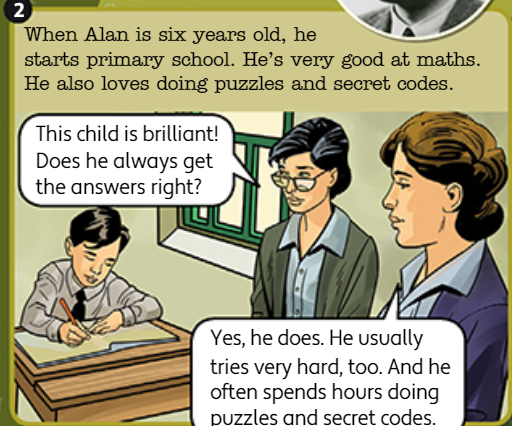LIVEWORKSHEET
ADVERBS OF FRECUENCY.
https://www.liveworksheets.com/w/en/english-second-language-esl/496339
https://www.liveworksheets.com/w/en/english-second-language-esl/449021
https://www.liveworksheets.com/w/en/english-second-language-esl/188070
https://www.liveworksheets.com/w/en/english-second-language-esl/1869074
Lesson 3, page 6.
7. Read the story and write the answers.
(See Pupil's Book page 6.) Ask and say.
Picture 1.
What does Alan do in three weeks?

Picture 2.
What does Alan love doing?
Picture 3. What does Alan use maths to calculate?
Picture 4.How old is Alan when he starts secondary school?
Picture 5.What does Alan study at university?

Picture 6.
Where does Alan work after university?

Picture 7.
What's the name of the code Alan helps to crack?

It's called .......
Picture 8.
What does Alan develop at Manchester University?

Picture 9.
What is Alan's work important for today?

8. Look and write the message.Do you enjoy secret codes like Alan Turing?
Can you work out the message?
YA DOTE SUEW TAHT STEG DAGC INOR TCEL EROF TNAT ROPM ISIS EDOC TERC ESDN AECN EICS RETU PMOC NOKR OWS´G NIRU TNAL A
9. Read and circle. Write a review of the story. Tell your family about the story.
LIVEWORKSHEET
ADVERBS OF FRECUENCY.
https://www.liveworksheets.com/w/en/english-second-language-esl/496339https://www.liveworksheets.com/w/en/english-second-language-esl/449021
https://www.liveworksheets.com/w/en/english-second-language-esl/188070
THESE ARE THE FOCUS QUESTIONS.
I'm going to read the focus questions to you, pupils.
Let's read Rosa's post and the story title.
Let's explain the meaning of BIOGRAPHY and HERO.
Listen to the story (books closed)
This is the story title.
LET'S CHECK THE ANSWERS TO THE QUESTIONS.
What school subjects is Alan good at?
He's good at maths and science.
What does he love doing?
He loves doing puzzles and secret codes.
Read the sentences and say whether they are true or false.
Correct the false sentences.
1. Alan's very bad at maths. False.
Alans's very good at maths.
2. Alan loves doing puzzles and codes. True.
3. At secondary school, Alan works hard at all subjects.
False. Alan works hard in science and maths.
4. Alan studies English at Oxford University. False.
Alan studies maths at Cambridge University.
5. The Turing Machine is a way of calculating numbers. True.
6. Alan develops one of the first computers Cambridge University. False.
Alan develops one of the first computers at Manchester University.
Alan developed.....
Values:
Remember: it is important to follow your interests where possible.
Now, tell us about that in English or L1.
What are you interested in doing?
Do you learn about it at school?
Do you develop your skills at home?
Now, Pupil´s Book, page 7. Activity 10.
Talk about it! Ask and say. Ask the questions. The pupils say their opininios and give their reasons.
Technology: Bill Gates
Technology: Mark Zuckerberg
Katherine Johnson is best known as being a pioneering physicist, space scientist, and mathematician.
Mathematics: Terence Tao

Read the phrases.
(Ask th pupils to) Find the phrases in the story.
Give examples of when to use the phrases every day.
Use the phrases whenever appropriate from now on.
SECRET CODES ARE IMPORTANT
Alan Turing's work on computer science and secret codes is important for electronic gadgets that we use today.
1. biography.
2. Englishman
3. maths and science
4. maths
5. secret codes and computers
6. computer science.
The story is a biography of a famous Englishman.
At school, Alan Turing is very good at maths and science .
At university, he studies maths.
After university, he works on secret codes and computers.
Today he is called the father of computer science.
1. Alan learns to read.
2. He loves doing puzzles and secret codes.
3. He uses maths to calculate the flight path of some bees.
4. He's thirteen.
5. He studies maths.
6. He works at Bletchley Park.
7. It's called the Enigma code.
8. He develops one of the first computers.
9. His work is still important for the electronic gadgets we use today.
ENDING THE LESSON.
Can you tell me ten words from the story?
Tidy up,
put your books away and say goodbye.












































No hay comentarios:
Publicar un comentario